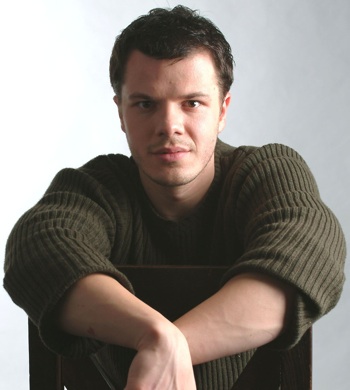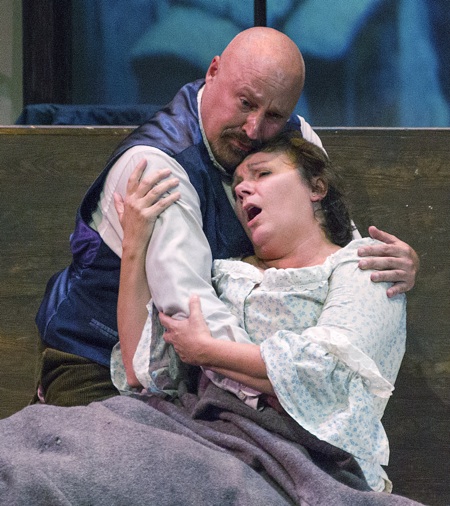The little opera that could…
The tiny Livermore Valley Opera delivered a coup last Saturday, Oct. 6, at the Bankhead Theater in downtown Livermore. Their season opener, Giacomo Puccini’s La Bohème, is an enduring and popular opera, and is, in fact, the single most performed opera of all time.
A punchy libretto by playwrights Luigi Illica and Giuseppe Giacosa had pin-turn mood swings that battered the audience time and again and turned unlooked-for laughter into unexpected tears. Puccini’s tightly penned opera was given fine voice by a cast that would be any director’s dream team.
 That lucky director was gifted baritone Eugene Brancoveanu, working a double shift by singing the major role of Marcello, an itinerant artist. He has appeared in hundreds of major productions, including with the San Francisco Opera, and recently as Papageno and Don Giovanni with the West Edge Opera, and has since begun directing as well. This is the first time he has attempted both, and rather than critique from without, he seemed more to inspire from within the cast.
That lucky director was gifted baritone Eugene Brancoveanu, working a double shift by singing the major role of Marcello, an itinerant artist. He has appeared in hundreds of major productions, including with the San Francisco Opera, and recently as Papageno and Don Giovanni with the West Edge Opera, and has since begun directing as well. This is the first time he has attempted both, and rather than critique from without, he seemed more to inspire from within the cast.
Not unsurprisingly, the first order of business was vocal, followed by enthusiastic acting and a direct aperture on the emotional framework. It was, in a word, compelling. A balanced review may include that the staging was clever, the sets were adequate, and the musicians at times groped for an ensemble sound.
But this is not a balanced review.
From Marcello’s first entrance to Mimi’s last notes, my heart was captivated. There is a time for grand sets and exquisite costumes, but when you have such accomplished singers, each of whom throws themselves into their roles, spectacle can be a distraction. Brancoveanu’s huge baritone was effortless in its warm coloration, and his acting beyond convincing.
As the curtain opened, he and Rodolfo, played by tenor David Gustafson, shivered and conspired to burn the opening act of Rodolfo’s newest play in order to warm up. Gustafson has a tenor voice that paired up perfectly, lusty with baritone undertones. They were shortly joined by Krassen Karagiozov as the musician Schaunard, and bass-baritone Philip Skinner as the philosopher Colline. Those four voices blended well while retaining their individual beauty, with Karagiozov inserting a note of dryness and Skinner a bit of gravel.
But when Mimi stumbled upon those bachelors, bonhomie made way for love. I heard Marie Plette sing the role of Ariadne in the Strauss opera, but that feat of vocal acrobatics did little to prepare me for her dedication to the role of Mimi. In “Si, mi chiamano Mimi” (Yes, my name is Mimi) Plette delivered steamy vowels, ending on high plateaus with a covered luminosity.
The characters were completed by the addition of Musetta, a coquettish coloratura soprano performed by Kristin Clayton, who vamped through “Quando m’en vo” in style.
Several factors aided their success. The 500-seat Bankhead Theater is intimate as opera spaces go, allowing the singers to modulate their sound and fully indulge in nuance. Also the principals were very accomplished—most have sung roles with the SF Opera or other prestigious houses—and beyond comfortable together. Rather than propel their voices with outsized vibratos, they seemed intent on having a blast, and subsumed their self in the service of perfect blends. (It is not uncommon in a larger house to hear two singers revving their outboard motors and calling it a duet.)
Lastly, they have obviously performed these roles many times, as they were able to throw themselves into the lives of the Bohemian characters they inhabited. And what singer, after all, is not a Bohemian, living a perilous and quixotic existence?
 Not uncommon in that life, Mimi’s gift is a spirit that burns too bright for her vessel. As we shared their art, we unwittingly share the burden of her tragedy, which may be why many eyes were damp.
Not uncommon in that life, Mimi’s gift is a spirit that burns too bright for her vessel. As we shared their art, we unwittingly share the burden of her tragedy, which may be why many eyes were damp.
Clever stage touches, all done on the cheap, added to the verisimilitude of the artistic life, accompanied by a huge volunteer effort, including an excellent chorus and charming children’s chorus. And the musician’s, led by Alexander Katsman, did find their way through Puccini’s surprisingly telegraphic score.
—Adam Broner
Photo top of director Eugene Brancoveanu as Marcello; photo bottom of David Gustafson as Rodolfo and Marie Plette as Mimi, photo by Barbara Mallon.
There are only four performances, with the last two this Saturday, Oct. 13 at 8:00 p.m. and a Sunday matinee on Oct. 14 at 2:00 p.m. For tickets, call 925-960-9210. And for other opera buffs, the SF Opera opens Moby Dick tonight, 10/10, and also this Saturday, 10/13. Meanwhile, West Bay Opera offers Tales of Hoffman Friday and Sunday, and the Metropolitan Opera does a live simulcast of L’Elisir d’Amore in several Bay Area movie houses on Saturday at 9:55 a.m. In bocca al lupo!
